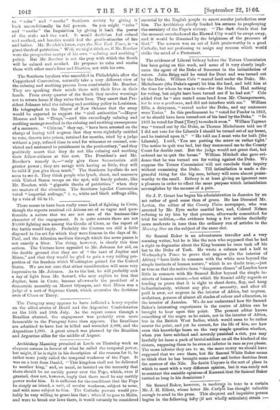Sir Samuel Baker is an adventurous traveller and a very
amusing writer, but he is like the man who supposed that he had a right to dogmatize about the King because he once took off his hat to the Duke of York. He wrote a column and a half to Wednesday's Times to prove that negroes (in the interior of Africa) " have little in common with the white man beyond the simple instincts of human nature," which is no doubt true,—just as true as that the native-born "dangerous classes" of London have little in common with Sir Samuel Baker beyond the simple in- stincts of human nature,—but which Sir Samuel oddly regards as tending to prove that it is right to shoot down, flog, and hang indiscriminately, without any plea of necessity, and after all peril is over, not negroes in the interior of Africa, but negroes, mulattoes, persons of almost all shades of colour and education, in the interior of Jamaica. We do not understand how Sir Samuel Baker's interesting experiences in the centre of Africa can be brought to bear upon this point. The present editor knows something of the negro as he exists, not in the interior of Africa, but in the British West Indies, which would seem to be rather nearer the point, and yet he cannot, for the life of him, see how even this knowledge bears on the very simple question whether, when you have subdued and. severely punished a riot, you may lawfully let loose a pack of brutal soldiers on all the kindredof the rioters, supposing them to be even as inferior in race as you please. The more inferior they are to us, the more mercy we should have supposed that we owe them, but Sir Samuel White Baker seems to think that he has brought some other and better doctrine from the sources of the Nile. No doubt Unyoro is the sort of place in which to meet with a very different opinion, but it was. surely not to contract the amiable opinions of Kamrasi that Sir Samuel Baker tarried so long in his dominions ?






























 Previous page
Previous page